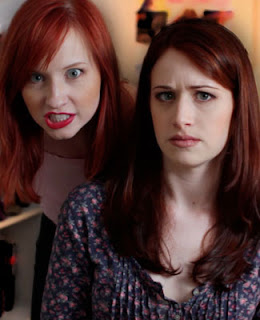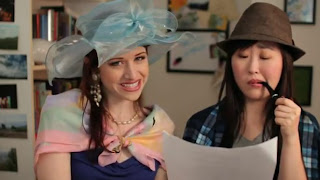When I was in grad school, we had a course on how to make
web videos. Part of the course was based around the actual shooting and
production of a web video, ideally the first one of a series, but none of us
were actually that ambitious. The other part, though, was about how to write a
web video, and more specifically, how to write a series.
The emerging new media is kind of a headache for people in
Hollywood right now. With anyone able to post anything and then have it viewed
by anyone, all for free, there’s no way to systematize the production
structure. More than that, there isn’t really a set way to make a web video
yet. And that is pretty freaking cool, actually.
We’ve known how to make movies since the 1910s. We get the
structure, we know how to fit everything together, and while the medium is
changing and evolving all the time, a movie is still a movie. The same goes for
television. It’s had years to set into a format that works really well for it.
The web? Not so much.
I know you young whippersnappers may not understand this,
but the internet wasn’t really a thing as recently as fifteen years ago. I
didn’t start using it until I was a teenager, and my family wasn’t exactly
behind the times. Well, at least not on that.
Web video came about even later, as web speeds have
increased to the point where streaming isn’t laughable and uploading doesn’t
make you cry. We’re now finally at the point where making movies for the
internet is actually a thing.
Which leads us to the big problem: what the hell does a web
video look like?
This isn’t as pedantic a question as it sounds. Do we make
web videos just like movies or TV shows? While we can upload any length of
video to the internet now, there’s no real law dictating what we should upload.
When Joss Whedon tackled the issue, he made Dr.
Horrible’s Sing-A-Long Blog, which consisted of three fifteen minute parts
posted over a series of days. It’s a great little musical, but it had a lot
more effects and a much higher production value than most of what’s getting
made.
Other web series, like the horrifically dramatic quarterlife, use two to three minute
chunks to tell a complete story. Sometimes those chunks are later assembled
into a full length movie, and other times it’s just a bunch of videos. Or, they
arrange those videos into seasons, like on The
Guild, and each season tells a complete arc, while all of them follow the
same basic characters. It’s more of a TV structure that way.
And still others do none of these things. I’m talking here
about The Lizzie Bennet Diaries, a
retelling of the classic novel Pride and
Prejudice as a series of web diaries made by the main character.
It’s…unique. And good, of course.
The LBD is kind of
brain-bending when you get down to it. Lizzie Bennet, played by an actress,
narrates the issues of her life into a camera operated by her best friend,
Charlotte, who is also an actress playing someone who is operating the video,
and they go through the issues that come up in the book.
There are times when
Lizzie has to recount things that happened off screen, so she and Charlotte,
and occasionally other people, dress up and read lines from a script to tell
you what’s going on and it’s all very well done but MY BRAIN HURTS.
Anyway, what’s unique about this storytelling method is that
it’s all verbal. We’re used to movies showing and not telling us things. It’s
actually something they teach you in screenwriting school. Never tell what you
can show. The LBD totally breaks this
rule. And it’s still really good.
Part of the reason why it works even though we almost never
see actual plot play out on screen (I said almost never, sit down) is because
of the self-imposed restrictions on the format. We know that we can’t see
what’s really happening in real time because Lizzie has told us that her video
blog is just going to consist of her telling us things. So we’re okay with
that.
It’s sort of like how we accept voiceover, except in this
case the voiceover is all the time, and you get to see the face behind the
voice. Like if episodes of Arrested
Development were only three minutes long and consisted only of Ron Howard
telling us things about the Bluth family. Though, that’d actually be pretty
funny.
The story, if you don’t know the book, is based around
Lizzie Bennet and the romantic lives of her and her sisters. They take some
basic liberties with the story to adapt it to a new format, but mostly it’s the
story we all know and at least tolerate. Girl is pressured by mother to get
married. Chaos ensues.
A lot of credit needs to go to the writers for managing to
make the whole “find a man or perish in the street” actually relevant in today’s
world, and for making Lizzie a feminist, compelling character, who also has her
flaws and quirks. She’s not perfect, and sometimes you want to smack her. That’s
good writing.
Another thing that’s unique about the LBD is that it proves that you can make a webseries about anything.
This is a series based on classic literature. You can make one about online
gaming. Red vs. Blue was even made
using actual games. Most people tend to assume that a web series is either
going to be some teenager bitching and moaning into a camera about their
terrible life (which is sort of what this is) or something super nerdy that
most people won’t like, when the reality is that it’s a much bigger market.
As far as the format goes, though, that battle is mostly
over. Videos of three to five minutes appear to be the norm, because that’s how
much attention span we’re willing to commit to something. Most series update
once a week, and generally they follow an episodic format. Of course, there are
a lot of them that follow a more sporadic form, like ones that put out a
different parody video every week (A Key
of Awesome) or ones that do nonfiction reviews or rants or stuff (Sex+ with Laci Greene). But mostly, that’s
the format we like.
I don’t feel like I need to say it, but the internet is
definitely still coming into its own, and the general format of web video is
probably going to change a couple more times before it’s done. We can
appreciate the fact that it’s one of the most democratic forms of entertainment
we have, a real meritocracy for the most part, and appreciate that even when Hollywood
tries to horn in on our fun, at least their still slaves to our interests.
MWAHAHAHAHA!
Sorry.






No comments:
Post a Comment